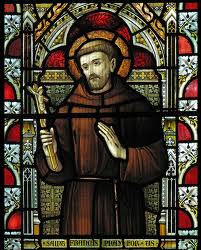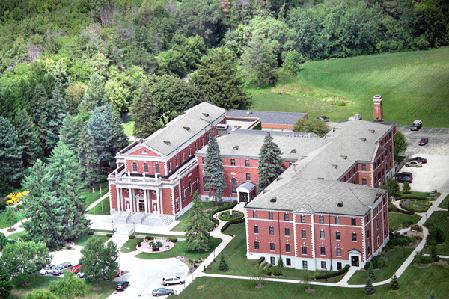
The Diplomatic Society
The DSSG is an international professional and fraternal society of diplomats and consuls dedicated to advancing global peace, development and humanitarianism. The Society, a non-profit organization was founded in 1996 in the UN in New York and has 501(c)(3) nonprofit organization status.
The Archangel Gabriel is the Patron Saint of Diplomats, and the inspiration for the Society. He is recognized as “God’s Messenger’ by the Christian, Islamic and Jewish faiths, and as a universal symbol for Interfaith Dialogue. Our motto is “Pro Deo Et Mundo” - For God and the World.
In furtherance of its mission the Society organizes conferences and training around the world and in cyberspace, and holds professional and social events at the diplomatic and consular corps level. While primarily a society of Catholic diplomats, the DSSG closely engages with brothers and sisters of all faiths. Members of other faiths are welcome in the DSSG provided they respect our ideals and traditions. Non-Catholic honorary members are members of the Diplomatic Society of the Archangel Gabriel.
Established in 1996 by Catholic diplomats at the United Nations in New York, the DSSG has become a truly global network. The Confrères Consœurs of the Society currently represent or are resident in Albania, Argentina, Austria, Belgium, Brazil, Bulgaria,Cambodia, Canada, Chile, Dominican Republic, El Salvador, Georgia,Guatemala, Hungary, Ireland, Italy, Jamaica, Netherlands, Nicaragua, Nigeria, Liberia, Malta , Marshall Islands, Mexico, Micronesia, Monaco, Mozambique, Peru, the Philippines, Poland, Portugal, Russia, Seychelles, Slovakia, Sovereign Military Order of Malta, South Africa, Spain, Switzerland,Thailand Turkey, Ukraine, United States, Venezuela and many other nations.
DSSG Confreres also serve with a number of international government and civil society organizations, including the United Nations Secretariat, the Trilateral Commission, the Council of Foreign Relations, and numerous Diplomatic & Consular Associations. Members and officers of the Royal families of Austria- Hungary, Portugal, and Georgia.
The DSSG is honored to be listed with the: United Nations Conference of NGOs in Consultative Relationship with the United Nations (as Associate Member), United Nations Global Compact, United Nations Department of Economic & Social Affairs, United Nations Economic Commission for Europe, United Nations Educational, Social and Cultural Organization, United Nations Office of Drugs & Crime, United Nations Environment Program, participates with UNGLS, UNCERF, UNISDR, UNOHA, European Community, World Trade Organization, the World Council of Churches and many other diplomatic and faith-based organizations worldwide.  |
|
Spiritual Dimension
We are a world-wide fraternal and spiritual society of diplomats, consular officials and other international relations professionals.
Historical examples of interfaith diplomacy can be found in the works of Francis of Assisi when he traveled to Egypt in 1219 to speak with Muslim’s in a spectacular attempt to broker peace with the sultan and his followers. He made such an impact with his preaching, that the sultan rebuffed some of his own religious advisors, the imams, who were insisting that Islamic law required that Francis must be beheaded. The Sultan in particular professed amazement at meeting a Christian who was also a person of peace and goodwill. Francis offered to be set on fire as a no-lose test — if he lived, it would be proof of the merits of the Christian religion but if he died, it would be because of his sins. Instead, the Sultan let him tour the historical sites in the Holy Land.
St. Maximilian Kolbe is a 20th century example of selfless Christian love for the dignity of all human life. He is also a great example of interfaith dialogue between our Catholic faith and our Buddhist and Jewish cousins. Maximilian Kolbe ministered to all of the individuals he encountered in the horrific unfolding of he Second World War, regardless of race, creed or culture. Additionally, as believers in a world of peaceful coexistence, Maximilian Kolbe should serve as the pinnacle example of our desire for peaceful coexistence throughout all mankind.
The Diplomatic Society of St Gabriel is recognized by the M. I. / USA ( http://consecration.com/) part of the 800 year old Franciscan Order. The M.I. has over 3 million members in 48 countries.
The Diplomatic Society , a fraternal organization, promotes the advancement of the diplomatic profession, spiritual development and brotherly fellowship. It also seeks to be a catalyst for furthering the humanitarian work of the international community, of the Church, the United Nations, states and civil society.
PRAYER
The Diplomatic Society is a global fraternity for Diplomats, Consuls,
and International Relations professionals.
The Society Cross has 12 points. These 12 points are in reference to the Prayer of St Francis
” Lord make me an instrument of your peace.”
1. Where there is hatred, let me sow love.
2. Where there is injury, pardon
3. Where there is doubt, faith
4. Where there is despair, hope
5. Where there is darkness, light
6. Where there is sadness, joy
”O divine Master, grant that I may not so much seek”
7. To be consoled as to console
8. To be understood as to understand
9. To be loved as to love
10. For it is in giving that we receive
11. It is in pardoning that we are pardoned
12. It is in dying that we are born to eternal life. Amen
Charity and faith are essential characteristics of the Society.
Membership implies a duty to meditate with particular care on the love of one’s neighbor, the sick, the poor, emigrants, refugees, and all those denied their basic human rights. Members should profess, with all possible charity and humility the sentiments of noble and chivalrous generosity. They should serve as an example to their friends, families and community.
Since Christ willed to be born poor, he chose for himself disciples who were poor. He made himself the servant of the poor and shared their poverty. He went so far as to say that he would consider every deed which either helps or harms the poor as done for or against himself. Since God surely loves the poor, he also love whose who love the poor. For when on person holds another dear, he also includes in his affection anyone who loves or serves the one he loves. That is why we hope that God will love us for the sake of the poor. So when we visit the poor and needy, we try to be understanding where they are concerned. We sympathize with them so fully that we can echo Paul’s words: “I have become all things to all men.” Therefore, we must try to be stirred by our neighbors’ worries and distress.
It is our duty to prefer the service of the poor to everything else and to offer such service as quickly as possible. Charity is certainly greater than any rule. Moreover, all rules must lead to charity. With renewed devotion, then, we must serve the poor, especially outcasts and beggars. They have been given to us as our masters and patrons.
|

